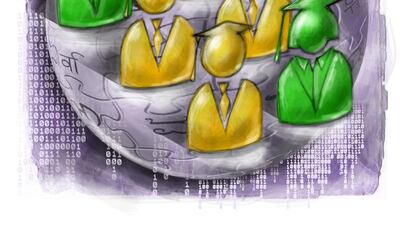Would you like to know how many platinum discs The Beatles’ 1967 album Magical Mystery Tour was awarded? Are you curious to find out why the Art Deco movement developed? How about understanding how cognitive behavioural therapy reduces anxiety? Or are you interested in the temperament of British shorthair cats?
When we look for answers to questions such as these, the first port of call is often the online encyclopaedia Wikipedia. It can feel as though almost every fact and opinion about life, the universe and everything gets a mention among the 30 million pages of this vast electronic database, which was founded in 2001 and has gone on to be ranked among the world’s top 5 websites. After all, with an army of enthusiastic volunteers generating content, there should be no reason for any individuals or topics to be ignored.
At least that is how it might seem.
But what if Wikipedia had an unspoken bias towards men? What if, because of the makeup of that army of unseen volunteers, it tended to ignore topics more of interest to women, or to underplay their role in the world we live in?
Some of these biases are easy to spot – entries on action films tend to be longer and more detailed than those about romantic comedies. But there are others of more profound concern. In the real world, about four in 10 American sociologists are female. But woman account for only two in 10 of those listed on Wikipedia.
Prof Hannah Bruckner from New York University Abu Dhabi (NYUAD) has begun a two-year study into gender bias in Wikipedia coverage of, in particular, history, sociology and computer science.
Working with Prof Julia Adams of Yale, she has been looking at the reasons behind this apparent under-representation of female academics and their work on Wikipedia.
It matters, she says, because the online encyclopaedia has become “the first go-to place for the majority of college students today” when they research subjects.
And if there is indeed gender bias, it could therefore be affecting the essays, dissertations and examination answers of the young people who will become the academics of tomorrow.
“The students interested in computer science or sociology, they go and do some research, and they are confronted with finding mostly male academics who seem to be the prominent academics doing research in the field they are interested in,” she says.
“Scholarship done by women is very important for these fields. If women are under-represented, the work they do is under-represented. There’s going to be a lack of some topics that are very important in the disciplines, some hot debates and interesting research.”
Part of the problem is that the site is largely written by men. Research in 2011 by academics at the University of Minnesota indicated that only about one in six contributors to Wikipedia was female.
It may be, commentators have suggested, that producing articles is a “geeky” activity that appeals more to men, or that the editorial process, which sometimes becomes adversarial when editors delete material, only to see it reposted by the original contributor, and possibly deleted again, tends to put women off.
Not only that, suggests Prof Bruckner, male academics may spend more time on self-promotion on the site than their female counterparts, sometimes even having “fan clubs” of male graduate students who submit material about them.
The researchers will look at academics at leading American universities, and try to forecast by age and number of academic citations by other scholars whether each person should have a page. This can be compared with real-life data on who does have such a page.
And with Wikipedia, you aren’t limited to looking at the entries themselves. Behind each entry, and available for anyone to see, are the apparently endless – and often arcane – discussions between contributors and editor about which entries should be included, and which details within them. These entries, Prof Bruckner believes, are particularly revealing.
But they are so vast in quantity that no one could read through all of them.
Instead, the academics will employ a computer algorithm to sift through the swaths of discussions, looking for mention of issues such as the “professor test”. The rules look at, for example, whether the person holds a university chair in a subject or if he or she is the editor of a major journal.
It is easy to forget how new Wikipedia is. Its millionth English-language article was posted only in 2006, five years after it was founded (it has since added three million more). For that reason, perhaps, academic study of it remains relatively sparse despite our increasing reliance on its pages as a “go-to” source of mostly accurate information.
Prof Bruckner’s hope is that having systemic data on the extent and reasons behind bias could mobilise resources to deal with the issue. It might help, she suggests, if universities encouraged staff to become Wikipedia contributors, ensuring important academic work does not get ignored.
They could, for example, expand the programmes some of them already run for academics on writing newspaper editorial columns – another area where female writers tend to be heavily outnumbered – to cover Wikipedia contributions.
“That is not something we usually do. We’re scientists, we’re not in the business of marketing our research. We have no training to do this,” said Prof Bruckner. She admits she has never contributed to Wikipedia herself.
The apparent bias could also be partly redressed by focusing on general initiatives to improve Wikipedia’s quality.
For Prof Bruckner, the Wikipedia project may also offer pointers about how the value of academic work in general is assessed.
“There is the gender issue, but also how people think about scholarship and what’s reputable scholarship or not,” she said.
newsdesk@thenational.ae


